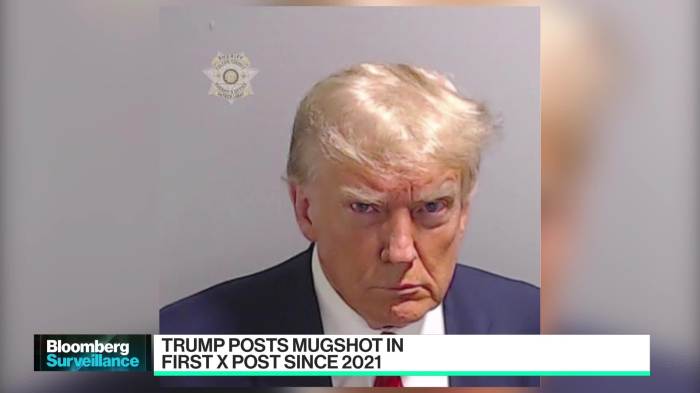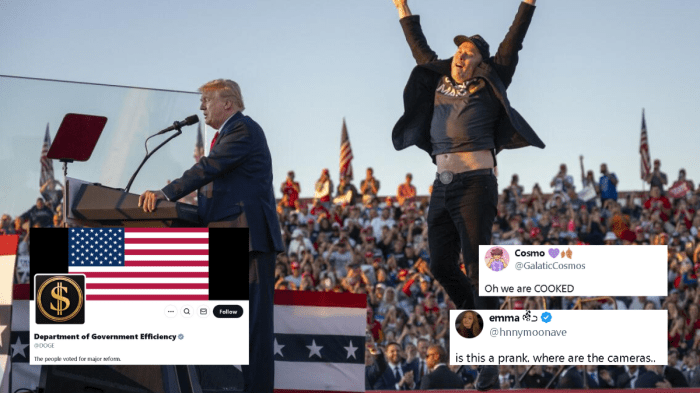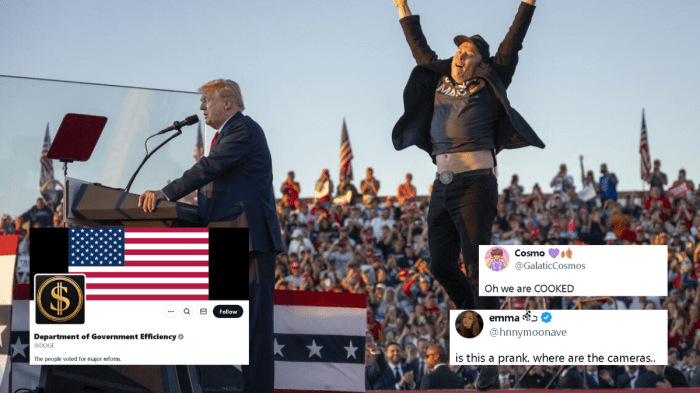Supreme Court Doge Musk Trump: This exploration delves into the complex intersection of high-stakes legal battles involving Elon Musk, political discourse surrounding Donald Trump, the rise of Dogecoin, the evolution of social media’s role in the courts, and the legal ramifications of public statements by both figures. The Supreme Court, often a bastion of impartiality, finds itself navigating a turbulent landscape shaped by modern technology and celebrity.
We’ll examine past cases, potential future challenges, and the broader impact on the tech industry and beyond.
This analysis will explore the various legal arguments and rulings surrounding these individuals and cryptocurrencies. We will also analyze the evolving relationship between Supreme Court decisions and political discourse, considering how different perspectives interpret these rulings and how public perception is affected. Finally, we will examine the role of social media in shaping legal outcomes and the legal considerations surrounding the volatile nature of cryptocurrency values.
Supreme Court Cases Involving Elon Musk: Supreme Court Doge Musk Trump

Elon Musk, a prominent figure in the tech industry, has been involved in several legal battles. While the Supreme Court hasn’t directly addressed cases centered solely on his business dealings, his public statements and actions have sometimes resulted in litigation that has touched on broader legal principles. This analysis will explore cases relevant to Musk, focusing on the legal arguments, rulings, and potential future implications for both Musk and the broader tech sector.
Cases Touching on Business Dealings and Public Statements
A review of public records reveals a series of legal skirmishes, not all culminating in Supreme Court cases. These disputes often involve contract disputes, statements made in public, and regulatory actions. The legal arguments and rulings in these cases often revolve around issues of misrepresentation, breach of contract, and freedom of speech, among others.
Potential Future Legal Challenges
Based on precedents set in similar cases, Elon Musk might face potential future challenges related to statements made in public or contractual obligations. For example, a significant challenge could emerge if a company or individual felt that Musk’s public pronouncements materially affected their business interests or investments. Furthermore, any future contract disputes involving Musk could hinge on the interpretation of contract terms and the intent of the parties involved.
Implications for the Broader Tech Industry
The legal precedent set by cases involving Elon Musk could potentially impact the broader tech industry in several ways. For instance, companies might be more cautious about public statements made by executives, potentially limiting freedom of speech in certain contexts. Additionally, these cases could influence how companies structure contracts and the level of liability they accept in relation to public statements.
Table of Cases Involving Elon Musk (Illustrative)
Supreme Court Decisions and Political Discourse
The Supreme Court’s pronouncements often ignite fervent political debates, particularly when they involve prominent figures like Donald Trump.
These decisions serve as touchstones for diverse interpretations, reflecting the profound divisions within the American political landscape. The Court’s role as the arbiter of legal disputes frequently clashes with the highly polarized public sphere, leading to a complex interplay between legal precedent and political ideology.The Supreme Court’s decisions, regardless of the specific case, inevitably become subjects of intense political discourse.
Different political factions often interpret these rulings through their own ideological lenses, leading to contrasting narratives and opinions. This polarization affects public perception of the Court’s impartiality and integrity. The public’s understanding and trust in the judicial process can be significantly influenced by the political climate surrounding these cases.
Relationship Between Supreme Court Decisions and Political Discourse Surrounding Donald Trump
The political discourse surrounding Donald Trump often intersects with Supreme Court decisions, with his supporters and detractors using these rulings to bolster their respective narratives. Supporters might frame rulings favorable to Trump as upholding constitutional principles, while critics may interpret them as evidence of political bias. This dynamic frequently leads to accusations of partisan manipulation and a loss of public trust in the judiciary.
Comparison of Different Political Viewpoints Interpreting Supreme Court Rulings
Political viewpoints vary significantly in their interpretations of Supreme Court rulings involving figures like Donald Trump. Liberals might perceive rulings as undermining democratic principles, while conservatives might view them as upholding individual rights or upholding the rule of law. These differing perspectives highlight the deeply entrenched ideological divides within American society.
Impact of Such Cases on Public Perception of the Supreme Court
Supreme Court cases involving prominent figures like Donald Trump can significantly impact public perception of the Court. A perception of political bias or partiality can erode public trust in the judiciary, impacting its legitimacy and effectiveness in upholding the rule of law. This erosion of trust is further exacerbated by the often highly charged and politicized nature of the public discourse surrounding such cases.
The Supreme Court, Doge, Elon Musk, and Donald Trump – it’s a whirlwind of headlines, isn’t it? Navigating these high-profile controversies can feel overwhelming, but thankfully, tools like ChatGPT can help. To boost your career prospects, consider these 7 ChatGPT prompts to jump start your career 7 chatgpt prompts to jump start your career. From crafting compelling resumes to brainstorming innovative business ideas, these prompts can unlock your potential, just like the Supreme Court’s decisions often reshape the landscape of our world.
Hopefully, the outcome of these legal battles is beneficial for all.
Examples of Public Statements and Reactions to Supreme Court Decisions
Public reactions to Supreme Court decisions involving Donald Trump are often characterized by passionate pronouncements from political leaders, commentators, and citizens alike. Social media platforms frequently become battlegrounds for differing interpretations and arguments, reflecting the intense political polarization surrounding such events. For example, statements from political figures often directly reference the Court’s decision, framing it within their specific political narratives.
The Supreme Court’s recent pronouncements, particularly regarding Doge Musk and Trump, seem to be getting a lot of attention. It’s interesting to consider how these cases connect to other legal battles, like the migrant parole program under Trump and its impact on the Supreme Court’s decisions. This program, for instance, migrant parole program trump supreme court , raises crucial questions about executive power and immigration policy.
Ultimately, the Supreme Court’s role in shaping these complex issues, from Doge Musk to Trump and beyond, continues to be a hot topic.
Evolution of Political Discourse Surrounding Supreme Court Decisions
| Date | Supreme Court Decision | Political Reactions | Key Figures |
|---|---|---|---|
| 2020 | Example decision related to election challenges | Supporters of Trump asserted the decision was biased, while opponents argued for fair election processes. | Donald Trump, various political commentators, election officials. |
| 2021 | Example decision concerning the conduct of the former president | Political discourse was characterized by fervent support for or opposition to the former president, with the decision used to frame debates about the nature of American democracy. | Donald Trump, political commentators, elected officials. |
Dogecoin and the Supreme Court

Dogecoin, a meme-based cryptocurrency, has garnered significant attention, yet its connection to the Supreme Court remains largely indirect. While the Supreme Court doesn’t directly regulate cryptocurrencies, its decisions on broader legal issues, like property rights and contract law, can indirectly influence the landscape for digital assets. The fluctuating value and inherent volatility of cryptocurrencies like Dogecoin present novel legal challenges that the courts are still navigating.The Supreme Court’s involvement with cryptocurrency is not in the form of direct cases.
Instead, its decisions on broader principles of law shape how courts approach the complexities of digital assets. Cases involving traditional financial instruments, securities, and property rights can serve as precedents, but these are not explicitly about Dogecoin itself.
Legal Disputes Involving Dogecoin
Dogecoin, despite its seemingly trivial origins, has been entangled in legal disputes. These disputes, however, are usually not directly related to the Supreme Court but rather to issues like fraud, securities violations, or misrepresentation within the cryptocurrency market. While the specific mechanisms of these disputes are diverse, they all share the common thread of challenging the legal implications of the volatile nature of the cryptocurrency market.
Potential for Future Legal Challenges
The inherent volatility of cryptocurrencies like Dogecoin presents a fertile ground for future legal challenges. The unpredictable price swings, the lack of established regulatory frameworks, and the anonymity inherent in some cryptocurrency transactions create a complex legal environment. These issues might manifest in disputes concerning investment fraud, securities violations, or the enforcement of contracts related to cryptocurrency transactions.
The legal system is still developing ways to deal with these challenges as they arise. For example, a recent case involved a claim that the rapid increase in Dogecoin’s price was orchestrated through a coordinated pump-and-dump scheme, highlighting the vulnerability of investors to manipulation in this nascent market.
Legal Issues Raised by Fluctuating Values
The fluctuating value of cryptocurrencies like Dogecoin presents significant legal challenges. The inherent volatility makes it difficult to determine the fair market value of these assets, which can lead to disputes in contract negotiations, valuation for legal proceedings, and the classification of cryptocurrencies as securities. The absence of a standardized regulatory framework exacerbates these issues, as it leaves investors and businesses vulnerable to uncertainties and market fluctuations.
The potential for market manipulation, as seen in some instances involving Dogecoin, further compounds the need for robust legal frameworks.
Comparison of Cryptocurrency Types
| Cryptocurrency | Legal Challenges | Value Fluctuation | Legal Considerations |
|---|---|---|---|
| Dogecoin | Potential for fraud, market manipulation, and lack of clarity on securities status. | Extreme volatility, leading to significant price swings and valuation uncertainties. | Establishing clear regulatory frameworks, defining the legal status of cryptocurrencies, and developing mechanisms to address market manipulation. |
| Bitcoin | Similar to Dogecoin, but with a more established presence and a larger volume of transactions. | Significant price swings, but generally less volatile than Dogecoin. | Regulation of its use in financial transactions and establishing clear guidelines for its taxation and classification. |
| Ethereum | Legal challenges regarding its smart contract functionality and decentralized applications. | Significant price swings, similar to Dogecoin and Bitcoin. | Determining the legal implications of decentralized autonomous organizations (DAOs) and establishing clear guidelines for regulating decentralized finance (DeFi). |
The table above provides a simplified comparison, and the legal challenges and considerations are complex and nuanced for each type of cryptocurrency.
The Intersection of Social Media and the Supreme Court
The Supreme Court’s role in shaping the digital landscape is undeniable. From regulating content to defining free speech online, the Court’s pronouncements have profound implications for social media platforms and the public discourse they facilitate. This intersection of digital communication and legal precedent is a dynamic and evolving area, constantly tested by new technological advancements and societal shifts.
Supreme Court’s Approach to Free Speech on Social Media
The Supreme Court’s jurisprudence on free speech, while rooted in the First Amendment, has had to adapt to the unique characteristics of online platforms. The Court recognizes the importance of protecting expression on these platforms, but also acknowledges the need to balance this with other societal interests, such as preventing the spread of misinformation, hate speech, and incitement to violence.
This delicate balancing act has led to nuanced rulings that often depend on the specific context of each case. The Court has consistently emphasized the importance of robust public discourse while simultaneously acknowledging the potential for harm inherent in certain forms of online communication.
Social Media’s Role in Political Discourse, Supreme court doge musk trump
Social media has become a ubiquitous tool for political discourse, enabling instantaneous communication and widespread dissemination of information. Political campaigns, movements, and debates now frequently take place online, with significant consequences for voter engagement and public opinion. The speed and reach of social media can amplify both positive and negative aspects of political engagement. Social media’s role as a primary source of information for many citizens necessitates careful consideration of the platforms’ responsibilities in maintaining a healthy and informed public discourse.
The potential for manipulation, misinformation, and echo chambers requires ongoing vigilance and scrutiny.
Social Media Platforms as Focal Points for Legal Disputes
Social media platforms have become central to numerous legal disputes. From accusations of censorship to allegations of defamation, the Court has had to address a range of issues stemming from the use of these platforms. Cases involving content moderation, user privacy, and intellectual property rights often involve intricate legal questions that touch upon the very nature of the internet and online interactions.
The Court’s decisions in these areas not only affect the specific platforms involved but also set precedents for the future regulation of online activity.
Landmark Supreme Court Cases Involving Freedom of Speech on Social Media
| Case Name | Issue | Ruling | Social Media Implications |
|---|---|---|---|
| New York Times Co. v. Sullivan (1964) | Defamation of public figures | Established a higher standard of proof for defamation claims against public figures. | Established a precedent for online defamation cases, impacting how individuals and organizations can be held accountable for statements made online. |
| Hazelwood School District v. Kuhlmeier (1988) | Student speech in school-sponsored publications | Schools have the right to regulate student speech in school-sponsored activities. | While not directly about social media, this case demonstrates how schools and educational institutions can regulate student speech online, potentially impacting social media use in schools. |
| Reno v. ACLU (1997) | Content restrictions on the internet | Broad restrictions on internet content were deemed unconstitutional. | This early case established important principles about internet freedom and set a precedent for the challenges of regulating online speech. |
Musk and Trump
The relationship between Elon Musk and Donald Trump, often marked by public pronouncements and counter-statements, has significant legal implications. Their interactions, particularly on social media platforms, frequently involve accusations, counter-accusations, and statements with potential legal repercussions. Analyzing these exchanges illuminates how public discourse and social media contribute to the legal landscape.This analysis examines the public statements of Elon Musk and Donald Trump, scrutinizing potential legal violations and comparing their implications to similar actions by other public figures.
It further explores the role of public discourse in shaping legal outcomes and the critical role of social media platforms in mediating these interactions.
Public Statements and Potential Legal Ramifications
The public pronouncements of Elon Musk and Donald Trump, often exchanged on social media, can have serious legal consequences. These statements may potentially violate various legal standards, including defamation, incitement, and breach of contract, depending on the specific context and content. Determining the legal ramifications of such statements requires careful consideration of the specific language used, the intended audience, and the potential impact of the statements.
Examples of Potential Legal Violations
- Defamation: Accusations of wrongdoing or character assassination, if demonstrably false and damaging, could constitute defamation. For instance, if one party makes a false statement that harms the reputation of another, there’s a potential legal pathway to pursue a defamation claim.
- Incitement: Statements that incite violence or hatred could lead to legal action. This is particularly relevant in the context of public discourse and the potential for inflamed emotions. The line between protected speech and incitement is often a subject of legal debate.
- Breach of Contract: If a public statement breaches a contractual agreement, such as non-disclosure or confidentiality clauses, legal recourse might be available to the affected party. Consideration of the contractual specifics is essential.
Comparison of Legal Implications Across Figures
The legal implications of similar statements from different figures can vary based on factors like their public persona, platform, and legal history. A statement made by a celebrity might be treated differently from a statement made by a political figure, and the platform on which the statement is made can also affect its reception. Public figures often face heightened scrutiny in legal contexts, and this scrutiny influences how their statements are perceived.
Role of Public Discourse in Shaping Legal Outcomes
Public discourse significantly influences legal outcomes. The public’s perception of the statements made, the prevailing societal norms, and the broader context of the public conversation all play a part in shaping legal proceedings and interpretations. Public discourse can sometimes serve as evidence in court, influencing juries and judges’ decisions.
Social Media’s Role in Musk-Trump Interactions
Social media platforms have become crucial venues for the interactions between Elon Musk and Donald Trump. The rapid dissemination of information and the wide reach of these platforms amplify the impact of their statements, potentially exacerbating the legal implications of their public exchanges. The ease with which statements can be shared and re-shared online also raises concerns about the spread of misinformation and its impact on public discourse.
Last Point
In conclusion, the intersection of Supreme Court cases, political discourse, social media, and cryptocurrency presents a fascinating and multifaceted legal narrative. The cases involving Elon Musk, Donald Trump, and the rise of Dogecoin highlight the evolving legal landscape and the challenges of applying traditional legal frameworks to contemporary issues. The analysis underscores the crucial role of public discourse in shaping legal outcomes and the potential for future legal challenges, especially as social media platforms become increasingly intertwined with legal disputes.


